![]()
Conditions of reformists for endorsing Larijani in 2021 presidential election
The editorial of Arman Daily focuses on what might force Iranian reformists to endorse Ali Larijani- who is currently the Speaker of the House- in the upcoming presidential election in 2021.
The editorial asserts that recently the issue of possible endorsement of reformists for Ali Larijani has been raised. So far, there has been no discussion as to Larijani representing the reformist movement in Iran. Of course, one must pay attention that things might go in a way that the reformist movement may not be able to choose one of its own elites and figures in the upcoming election.
The editorial continues that if so, then choosing Larijani can be discussed. It must be acknowledged that we should wait and see what other options will be introduced until the next election. Only then, the reformists can have a discussion about who will be a viable choice for them. Hopefully, no such things will happen, and the reformists can introduce their own main option by then.
The editorial adds, “unfortunately in past two presidential elections, reformists lost their own main options and had to endorse Hassan Rouhani. But Rouhani did not use reformists in his own government as much as he should.”
The editorialist concludes that it is not unusual for reformist to endorse non-reformists in presidential elections, as they have already shown that they are after interaction with the moderates and high turnout in elections.
Arman Daily on October 17, 2018
Amending election laws cannot be by order!
The editorial of Arman Daily focuses on amending the election laws in Iran, as well as whether this can be done by the order of supervisory entities like the Guardian Council.
The editorial asserts that the Spokesperson of the Guardian Council, Abbas Ali Kadkhodai, has recently talked about the necessity of immediate amendment of election laws, but one should not be very optimistic towards amending laws in the country. That is because the Parliament is far from the ideal, and its views towards defending the rights of the candidates and voters are not exact and in favor of reformism.
The editorial continues the fact that supervisory entities order amending the election laws is questionable because they have no direct duty in this regard. It is the responsibility of the lawmakers to decide whether laws require amendment. If any bill is ratified, it is then the duty of supervisory entities to see if it is in contradiction with the spirit of the constitution and sharia.
The editorial adds, “Kadkhodie’s remarks show that what has been done so far has not been adequate, and the conditions must be fixed for the voters and candidates. Some might think that due to political, economic, and social conditions of the country, the supervisory entities have facilitated the conditions for the presence of all political currents. But referring to the past experiences shows that in revising the constitution and amending the laws of parties and election in the past 40 years, such amendments have not secured people’s rights as much as they should.”
The editorial concludes that as far as there is no change in viewpoints, it seems that any talks in this regard will not come to fruition.
Arman Daily on October 16, 2018
Dark future of the industry with banning exports
The editorial of Shorou Daily focuses on why the government banning export is wrong and to the disadvantage of Iranian industries and producers.
The editorial asserts that banning exports is an illogical, irrational policy for reducing prices and, in the short- and long-run, will have many ramifications for the domestic production and industry. The government policy in this regards is not right, given the new economic condition in Iran. And increasing exports must be one of the concerns of the government.
The editorial continues, “under the new condition of foreign currency in Iran, if the government stops exporting goods for any reason, it will be a hard blow against the domestic productions. Achieving an export market takes time and energy for the producers. If by wrong policy making, the government stops exporting the products made domestically and make the domestic producers lose their target market, then gaining the same market later will be very difficult or impossible for them.”
The editorial concludes that Iranian political leaders must not take such measures. If they are really after curbing the increase in prices within the country, they must look for other mechanisms. Banning exports is illogical and irrational.
Shorou Daily on October 15, 2018
Religious beliefs: superstition or disease?
The editorial of Etemaad newspaper tackles the question of religious beliefs and superstitions, asking if we are allowed to call them disease.
The editorial starts by quoting Saeed Hajarian, reformist thinker, “a while ago there was the news of clashes with supporters of ‘Yamani’ in Torbat-e Heydarieh. Then we witnessed that in some other parts of the country like Khuzestan and Qom, people supported Yamani. Supporters of Yamani are followers of someone called Ahmad al Hassan al Basri who claims that he is descendant of Imam Zaman. He also claims that by order of Imam Zaman, he has started to call on people. He has been able to mobilize some people in Iraq and Iran. The issue of delusion and superstition must be treated as a disease – just as it is dealt within the developed countries. There must not be any security confrontations with these people; instead, the cause of disease must be searched in the weakness of the government and the civil society.”
The editorialist then agrees with Hajarian that there should not be any security confrontations with these religious currents, but then raises the question as to calling them “superstition or disease?” and treating them in clinics. Why have these currents been known as examples of superstition? What is more, why is superstition a disease and bad? What are the criteria for recognizing that a belief is a superstition?
The editorial continues that many of the usual beliefs in any society can be deemed as superstition. For a non-Muslim, many of the convictions of Muslims and Shi’as can be examples of superstitions; just as for Muslims, Christian Trinity can be considered as superstition.
The editorial concludes that many of such labels can have their roots in racism. In racial relations, it is common to use such labels. Such judgments can create cultural gaps and violence.
Etemaad on October 14, 2018
Domestic Interactions
8.5 years of imprisonment for an Iranian with dual nationality
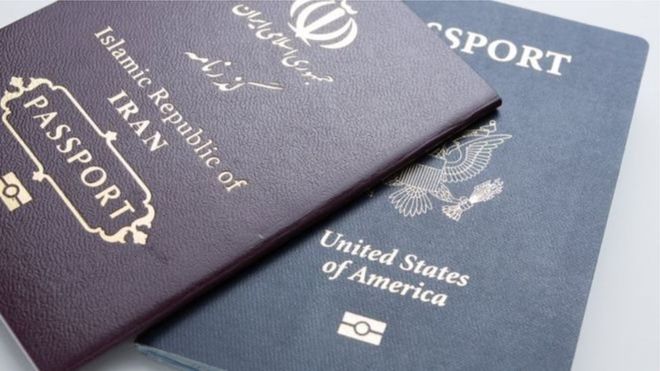
Spokesperson of the judiciary system said an Iranian with dual nationality has been sentenced to 8.5 years of imprisonment on the charge of ‘espionage’. Gholamhossein Mohseni Ejei did not offer many details regarding the accused who was named as ‘Tavakoli’. Ejei just mentioned that the charges against Tavakoli were raised based on ‘initial reports of intelligence ministry’.
In recent years, the issue of Iranians with dual nationalities – particularly among the managers – has been highlighted by the Iranian judiciary and security officials.
BBC Persian
Lawmaker: government and parliament must think of people’s livelihood
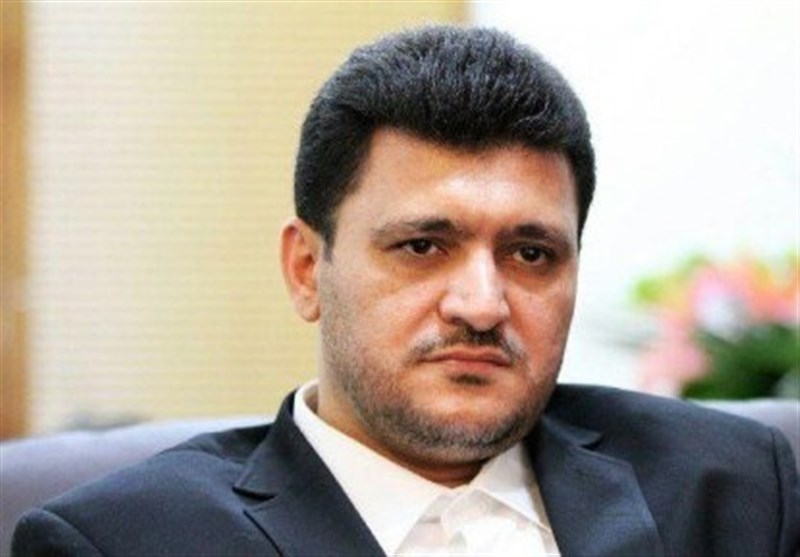
Golpayegan, MP Ali Bakhtiari, said that with adopting wrong economic policies, people should not be put under pressure every day, urging that the government and the parliament must think of people’s livelihood. He added that the parliament and the government must offer science policies with regard to economic problems that are compulsory to implement, asserting that the problems cannot be resolved with just impeaching and ousting the ministers.
Tasnim
Widespread teachers strike in different cities of Iran
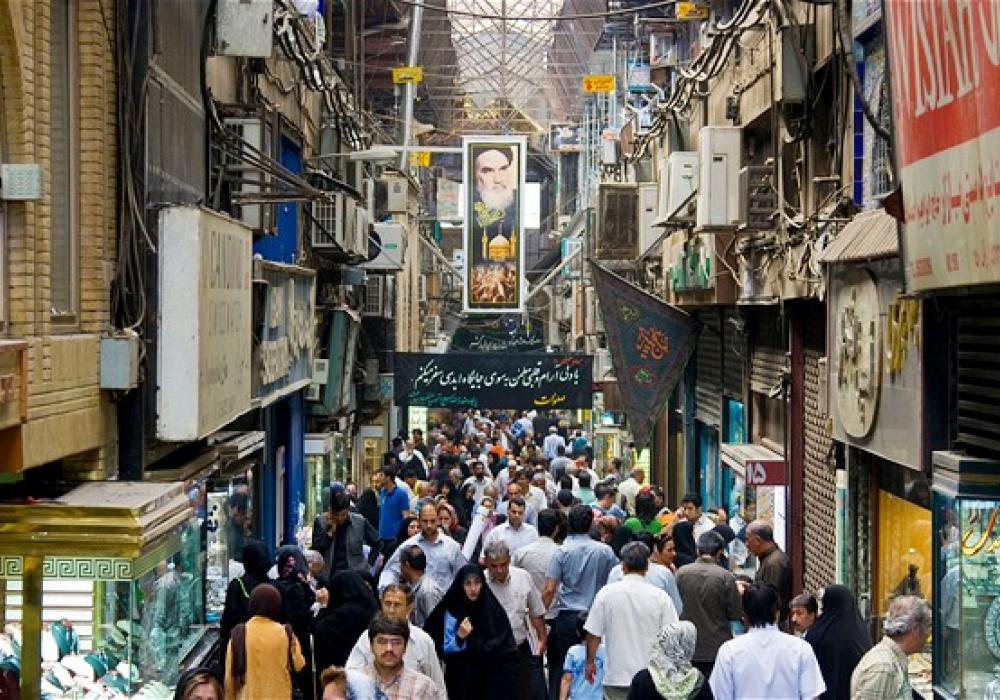
School teachers in different cities of Iran launched a strike on October 14 and 15 and did not go to their classes. This two-day strike was called by the Coordinating Council of Teachers Union. The Telegram channel of the union published images showing that teachers in cities like Shiraz, Lamerd, Kermanshah, Marivan, Saghez, Tabriz, Tehran, Sanandaj, Isfahan, Paveh, Hamedan, Ilam, etc. did not go to their classes.
Teachers demanded better pay and conditions, as well as, an end to the detention of education activists. They complained that their meager salaries are no match for the inflation, rising prices and the severe drop in purchasing power in the country.
Iran International
Students’ gathering against Rouhani in Tehran University
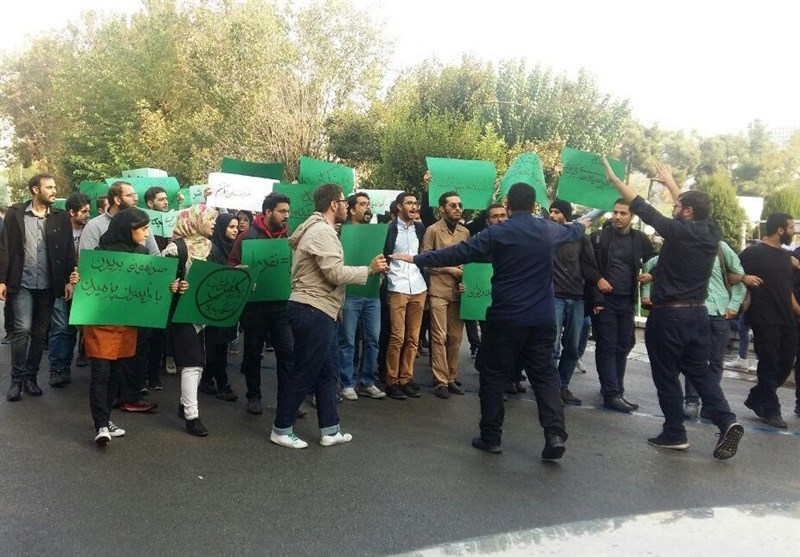
The ceremony for the beginning of the new education year in universities and educational centers was held, with the participation of Hassan Rouhani, at University of Tahran. A number of students from a reformist formation held a gathering at the university protesting against Rouhani, chanting slogans against his performance. Students also chanted slogans against the incompetence of the government and some ministers, unfulfillment of campaign promises, security conditions within universities.
Tasnim
Makaram Shirazi’s open letter to the head of the judiciary system
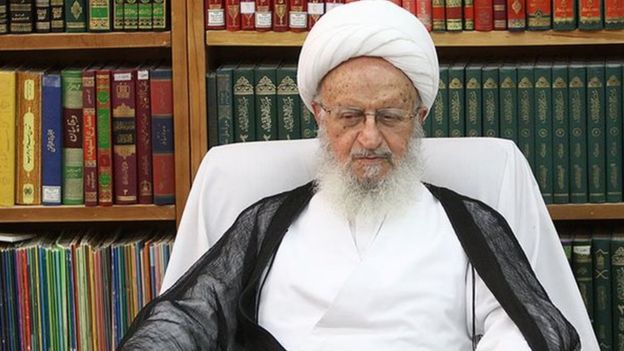
Ayatollah Nasser Makarem Shirazi, a source of imitation (taqlid) in Qom, published an open letter to the Judiciary Chief Ayatollah Sadegh Amoli Larijan, saying that he found Larijani’s responses to his criticisms unsatisfactory. Shirazi had said in his previous criticisms against the judiciary system, “the judiciary system must be in accordance with Islamic rules; why are some people imprisoned in contradiction with Islamic laws? Why do you issue sentences which make everyone laugh?’ He had accused the judiciary officials of making men pay the women’s mehrieh (the money the groom vows to pay the bride) in installment; in case, they cannot pay it in full.
In response to Shirazi’s criticisms, Larijani had said, a few days ago, “sometimes the criticisms stem from lack of knowledge […] our judges enforce the laws that are based on fatwas of Islamic jurists in seminaries. For us, they are not funny at all.”
BBC Persian
JCPOA and Sanctions
Iran’s ambassador to London: achieving JCPOA seemed impossible

Hamid Baeidinejad, Iranian Ambassador to UK, called the nuclear deal (JCPOA) an agreement that was the result of almost three years of hard working which seemed unachievable at the time, adding, “you just have to compare it with Trump’s agreement with North Korea which is just two pages.” Baeidinejad, talking to the Oxford Union said, “how come the U.S. wants to punish other permanent members of the U.N. Security Council for being committed to the council resolutions?” He stressed that this is against the international laws.
IRNA
The U.S. puts sanctions on 20 companies, financial institutes with ties with Basij
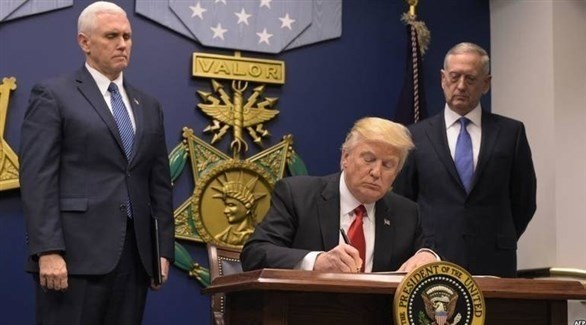
U.S. Department of Treasury announced that it has targeted a network of financial institutes and companies affiliated with Basij Cooperative Foundation which finiance Iranian militias. According to U.S. Department of Treasury, this network includes at least 20 companies and financial institutes under Basij Cooperative Foundation. U.S. Treasury says that based on these sanctions, American firms are not allowed to trade with this network.
Radio Farda
Lawmaker: The U.S. pulled back from sanctioning Iran’s oil

Ghassem Jassemi, the member of Parliament’s National Security and Foreign Policy Commission, holds that the U.S. has pulled back from sanctioning Iran’s oil, and is only pretending to put sanctions on Iranian oil. He added that after Trump announced oil sanctions on Iran, many countries that need Iran’s oil took measures to convince the U.S. to change its mind. Jassemi urged that no country in the world can fill the void of Iranian share of oil in the global market.
ICANA.ir
Iran, China emphasize developing cooperation and confronting U.S. sanctions
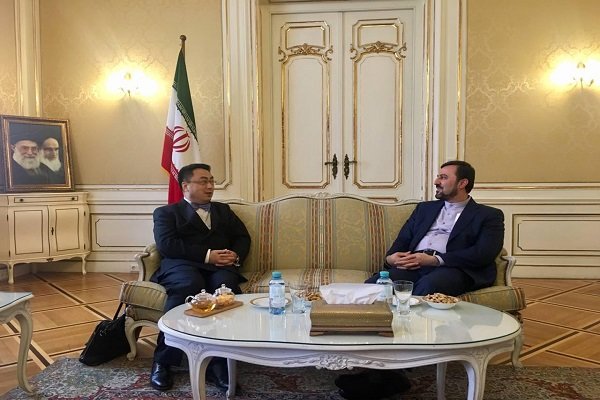
Permanent Representative of Iran to the United Nations (located in Vienna) Kazem Gharibabadi met with his Chinese counterpart Wang Qun, urging on developing partnerships in different fields.
Gharibabadi acknowledged the positive relations between both countries and China’s active role in confronting U.S. illegal unilateral sanctions while urging to maintain their mutual cooperation in different fields including the nuclear energy.
Mehr news
Economy
40 economic disruptors arrested

While identifying and arresting dealers in the foreign currency market, 40 people were arrested and handed over to judiciary officials in Tehran. Previously 196 economic disruptors had been arrested there. It is worth to mention over here that after the the U.S. re-impose sanctions against Iran, foreign currency and gold markets in the country have had severe fluctuations.
Young Journalists Club
Iran’s oil minister goes unexpectedly to Russia
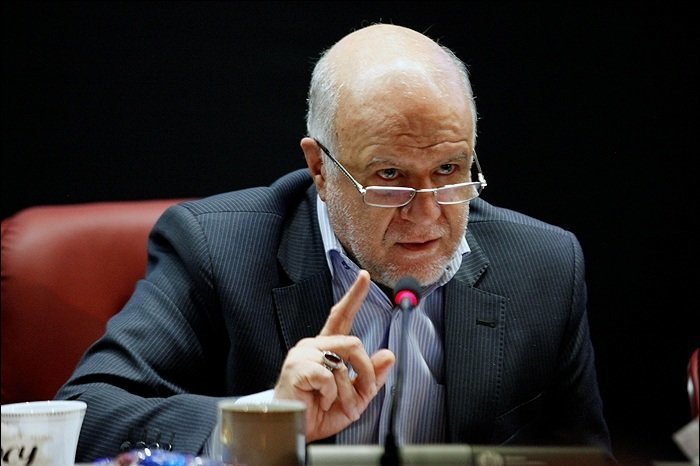
According to IRIB news agency from Moscow, Iranian Oil Minister Bijan Zanganeh entered Moscow on October 15 in an unannounced, unexpected trip. Upon his arrival, Zanganeh met with Russian Energy Minister Alexander Novak behind closed doors. In meeting with his Iranian counterpart, Novak said Iran and Russia are constantly in touch, and this has resulted in bolstering cooperation of both countries in trade, economy, and particularly in the field of energy. Oil ministers of Iran and Russia announced an improvement in producing more oil based on OPEC agreement, and cooperation between the two countries in the field of fuel and energy.
IRIB news
Gang of smuggling fuel in Fars annihilated
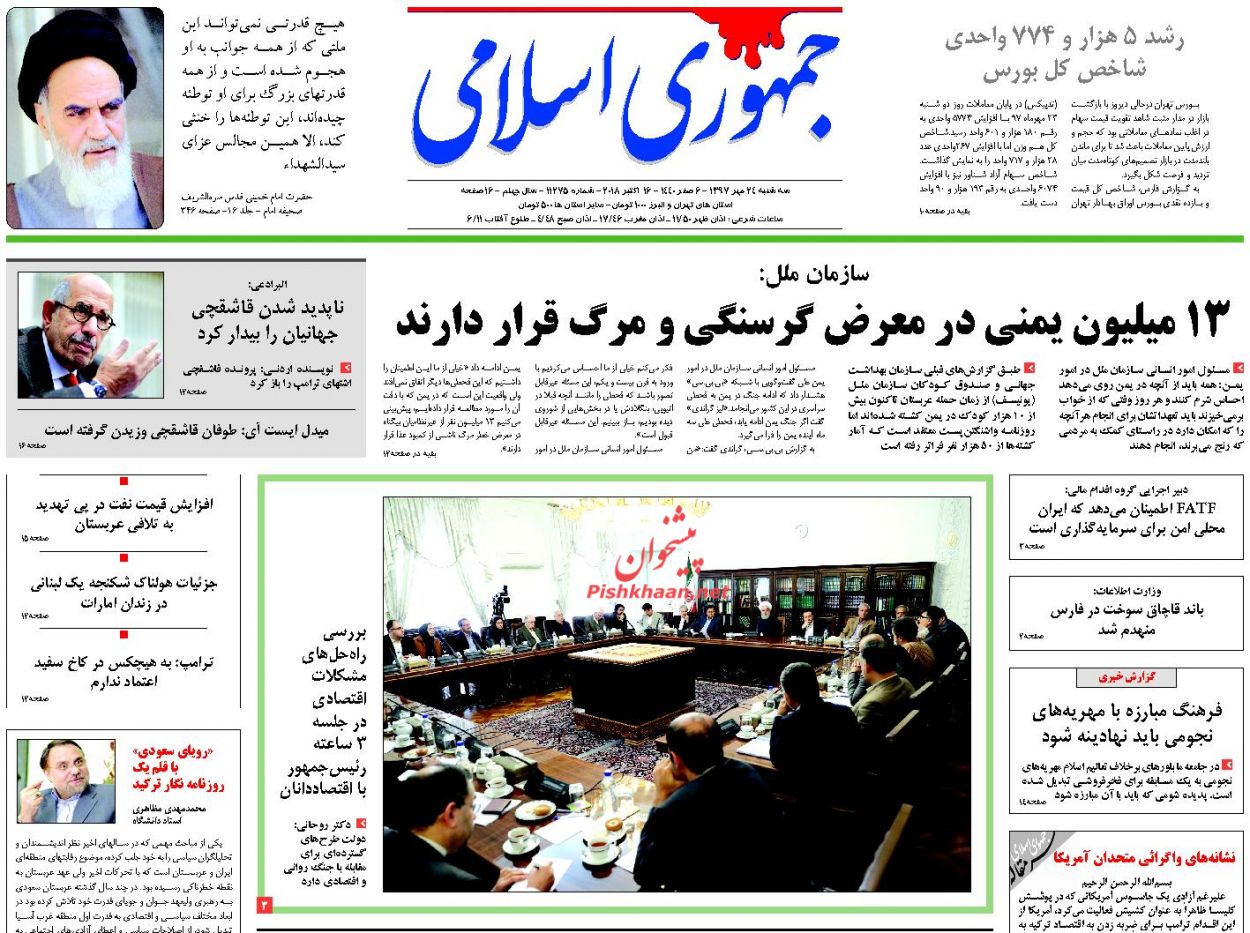
According to Iran’s intelligence ministry, six members of a gang smuggling fuel in Fars Province were arrested and turned in to judicial officials. They smuggled fuel from Shiraz to Zahedan, Iranshahr, and Chabahar Port for selling.
Jomhouri Eslami
Isa Kalantari: no way but to cut consumption of water
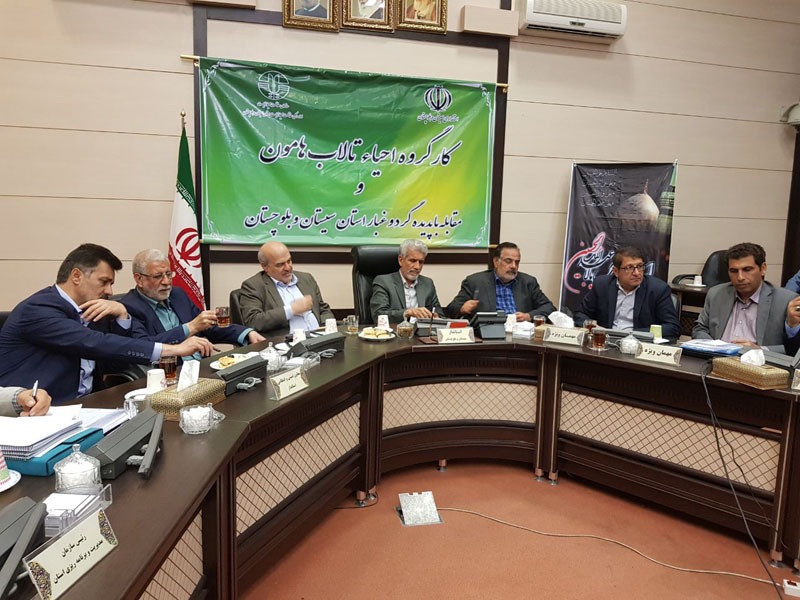
Vice President and head of the Department of Environment, Isa Kalantari, stressed on saving water, saying “we have no way but to cut the consumption of the water in the country.” Kalantari added that Iran is struggling with the issue of drought, and one of the worst droughts has taken place in Sistan and Baluchistan Province.
Kalantari asserted that climate change has had an adverse impact on Iran and the average precipitation in the country has dropped from 250 to 190 millimeters.
IRNA
Mohsen Rezaee: the value of national currency depends on political security and stability
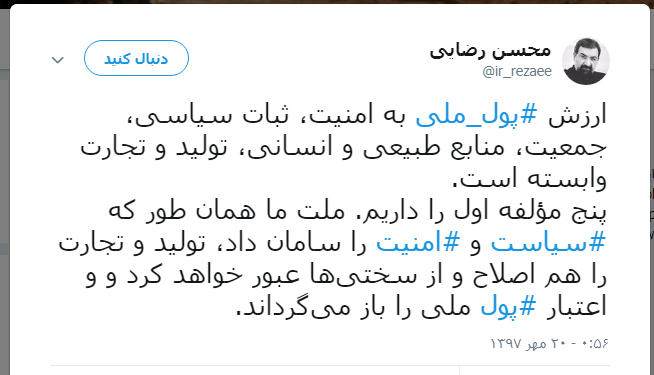
Secretary of Iranian Expediency Council Mohsen Rezaee said: ‘our nation will surmount the difficulties and will restore the value of the national currency’. Rezaee wrote in his twitter: ‘the value of national currency depends on the security, political stability, population, natural and human resources, production and trade. Just as our nation created order in politics and security, it will reform production and trade, and will surmount the difficulties, thus restoring the value of the national currency’.
Young Journalists Club
Farazi: Iran should cooperate more with China and India in the field of energy
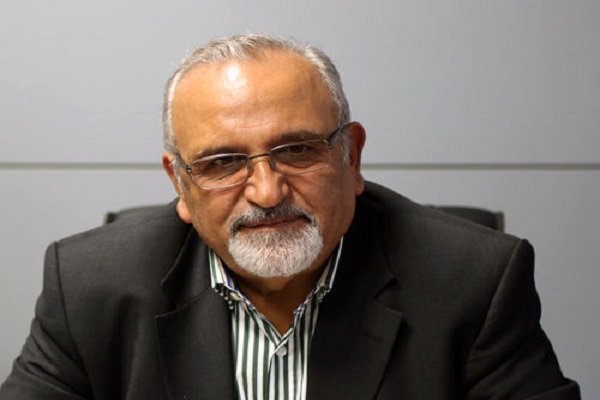
Iran’s former ambassador to Romania Ali Akbar Farazi said the U.S. trade war with India and China has created a good opportunity for Iran to increase cooperation in the field of energy with these two countries. Farazi added that Iran must take advantage of the gap created between the U.S. and its allies including Europe, Canada, and countries like Russia, China, and India. He urged that Iran must convince its customers to boost their cooperation in the field of energy, particularly purchasing its products and paying more attention to Iran’s market.
Mehr news
Reviewing suspension of Iran from the blacklist in FATF’s meeting

The meeting of Financial Action Task Force (FATF) will be held in Paris from Sunday, October 14 for 6 days. Officials from more than 200 countries will take part in this meeting. FATF will decided whether Iran’s suspension from its blacklist will continue or not.
In the last meeting of FATF, Iran was given the opportunity to take the necessary measures for implementing the recommendations of this group. In this regard, the Iranian government offered four bills to the parliament to implement the remaining of 41 recommendations. After long discussions in the parliament, the Guardian Council, and Expediency Council, these bills were eventually passed in the parliament.
Khordad news
Military
IRGC official: we are ready for joint operation to free Iranian border guards
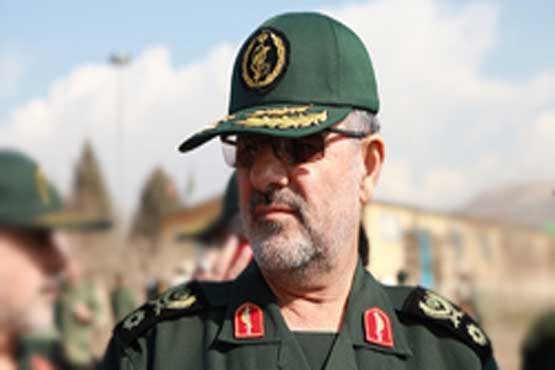
IRGC Ground Force Commander General Mohammad Pakpour pointed out to the abduction of 11 Basij forces in the city of Mirjaveh, saying that terrorists are located in Pakistan, and ‘we are ready for any joint operation with Pakistan Army against the miscreants for releasing the hostages’. He urged that the abduction must have taken place with help of infiltrators.
Jam-e-jam
Lawmaker: Iran’s advanced military equipment, not a threat but opportunity for neighbors
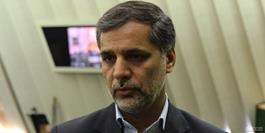
Hossein Naqavi Hosseini, the member of Parliament’s National Security and Foreign Policy, holds that Iran’s achieving advanced military equipment is an opportunity for different countries including the neighbors. While urging the significance of unveiling new Army’s drone in upcoming days, Naqavi Hosseini said that Iran has always been under international threats, which is why it has the right to defend itself according to the international laws.
ICANA
Iran’s anti-armor missile

Saegheh is an Iranian anti-armor missile which can penetrate 500 millimeters in the armor. It is a copy of U.S. missile Dragon, which was purchased from the US before the revolution. Saegheh is a short-range missile, weighing 14.5 kilograms and easily carried by an individual.
Tasnim
Iranian forces abducted in Pakistan border
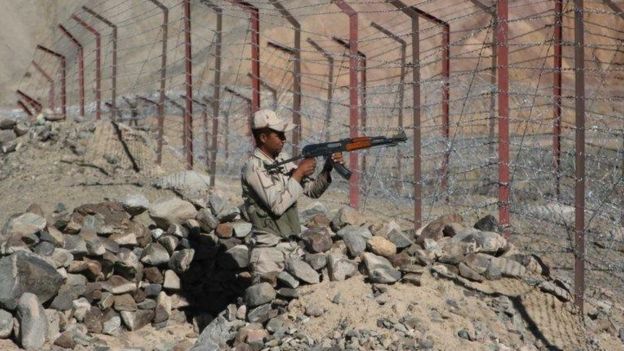
A number of armed forces of Iran have been abducted in Pakistan border. According to IRNA, these people are from Basij forces force security plan in the city of Mirjaveh. 14 people are reportedly kidnapped.
IRGC Quds Base located in Sistan and Baluchistan Province issued a statement saying that Iranian forces ‘were abducted with the collusion of infiltrators of counter-revolutionary groups’. Jaish ul Adl has taken responsibly for this abduction.
BBC Persian
Intelligence Minister: 300 terrorist teams destroyed so far
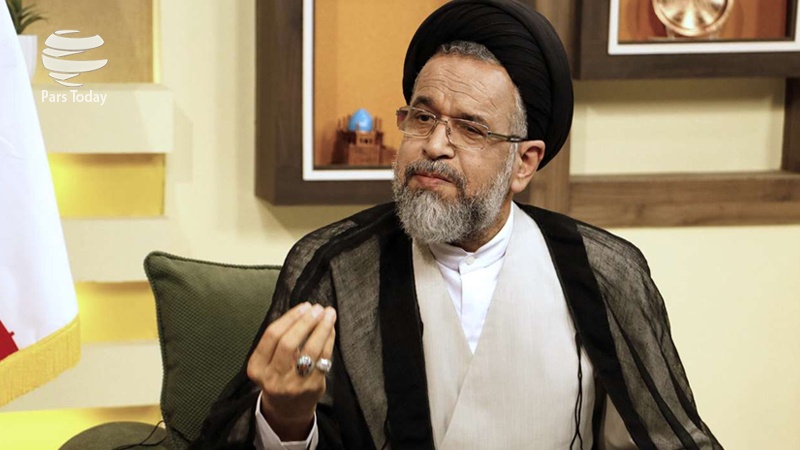
Iranian Intelligence Ministry Mahmoud Alavi said, “so far we have discovered and destroyed 300 terrorist teams and killed their members.” He added, “the intelligence ministry is standing strong against the enemies and confronts them strongly; we want people to feel peaceful when they hear the name of this ministry.”
Pars Today
Intelligence ministry: separatist terrorist team arrested in Kermanshah
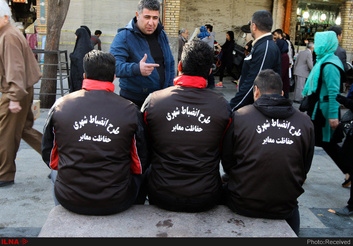
According to Iran’s Ministry of Intelligence and Security, security forces arrested a separatist terrorist team that had entered Iran from the western borders and were located in a house in the city of Kermanshah. “Two terrorists were killed in armed clashes,” added the intelligence ministry. Several guns, grenades, combat equipment, and team documents were seized by the security forces.
ILNA
Iran and the Region
Amir-Abdullahian: Iran and Russia are forerunners in fighting terrorism in the region
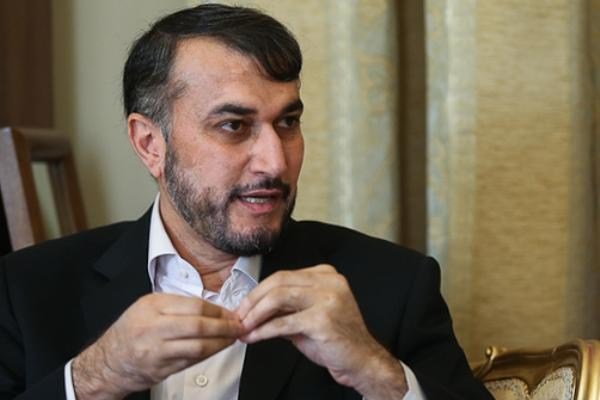
A special aide to parliament’s speaker in international affairs pointed out to Tehran’s full support for sustainable stability and security in the region, adding that instability in the region will harm all countries, and peace and security must return to the region through political solutions. In his meeting with Russian ambassador to Tehran, Amir-Abdullahian called the Islamic Republic and Russia, “forerunners in fighting terrorism,” urging that the cooperation of Iran and Russia has expedited the process of fighting terrorism in the region, and has had positive achievements for the region and for the whole world.
ISNA
Lawmaker: Russian S-300 in Syria has a message for Israel and its allies
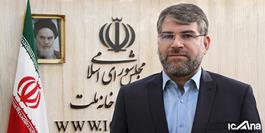
Javad Saadatinejad, hardline MP, said with regard to goals of deploying Russian S-300 to Syria that “the Russians, with their powerful presence in Damascus and increase in military activities in this country, announced to Israel and its allies that the time of the U.S. being superpower and being the only military pole has come to an end.” Saadatnejad said that with this move, the Russians warned the Israelis that they should not dictate their views on others any longer. He added that a “strong coalition has been formed between Iran, Russia, Turkey, and Syria, and these countries are trying to cut off hands of transregional forces from the Middle East.”
ICANA
Sarmadi: Iran not to spare any helps to confront terrorism in Afghanistan
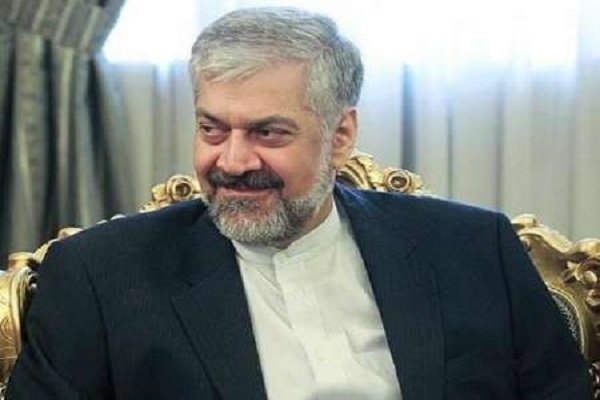
In meeting with Chief Executive of Afghanistan Abdullah Abdullah, Iran’s Vice Foreign Minister Morteza Sarmadi said Iran considers Afghanistan’s security as its own and will not spare any assistance in confronting terrorists in Afghanistan. Both sides reviewed the latest conditions in their bilateral relations, urging on bolstering them.
Sarmadi explained the security situation in the region – the defeat of terrorist groups in Iraq, Syria, and transferring these groups to Afghanistan and threatening countries in Central Asia– adding that Iran will do anything to confront these terrorist groups in Afghanistan.
Mehr news
Iran and the World
Iran confirms receiving memo of U.S. withdrawal from the Treaty of Amity
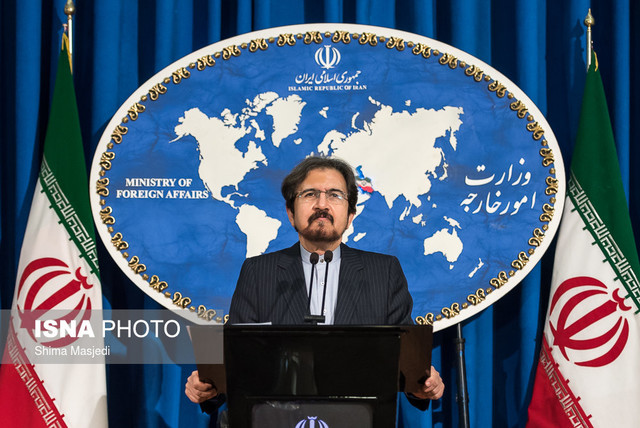
Iran’s spokesperson of foreign ministry announced that Iran has received a memo regarding the U.S. pulling out of the Treaty of Amity. Bahram Ghassemi added that even though dropping out of the Treaty has been announced by the U.S. officials, it is time-consuming and takes at least one year.
U.S. Secretary of State Mike Pompeo announced on October 3 that Washington was pulling out of the six-decade-old treaty with Iran that had provided the basis for normalizing relations between the two countries.
Treaty of Amity was signed between Iran and the U.S. in 1955, and it had been the foundation for friendly relations between Iran and the U.S. for years before the 1979 revolution. But after the revolution, the relations between the countries were cut after storming the U.S. embassy and taking the U.S. diplomats as hostages.
ISNA and BBC Persian
Iranian ambassador to U.N. : world should not remain silent against U.S. bullying, unilateralism
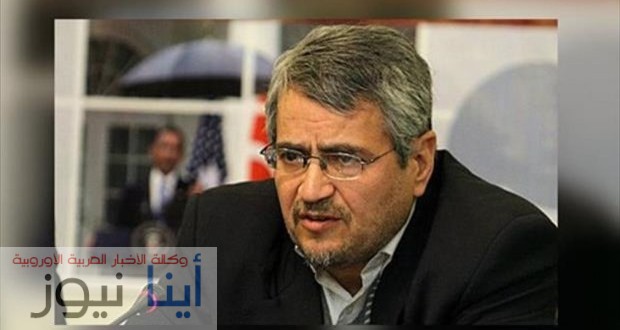
Iran’s Ambassador to the United Nations says that the world should not remain silent about the U.S. bullying and unilateralism. Pointing out to the U.S. illegal withdrawal from the nuclear deal, Eshaq Al Habib added that while Iran has fulfilled all nuclear obligations according to 12 consecutive reports of IAEA, the U.S. pulling out of the nuclear deal was illegal, and this country constantly violates its obligations within the framework of U.N. Security Council’s Resolution 2231. According to Al Habib, the United States has pressured other countries to violate this resolution, and that is for the first time in the history of U.N. that countries are pressured and threatened to be punished for following the U.N. Security Council resolutions.
IRNA
Khoshroo: threatening countries as a tool in US foreign policy
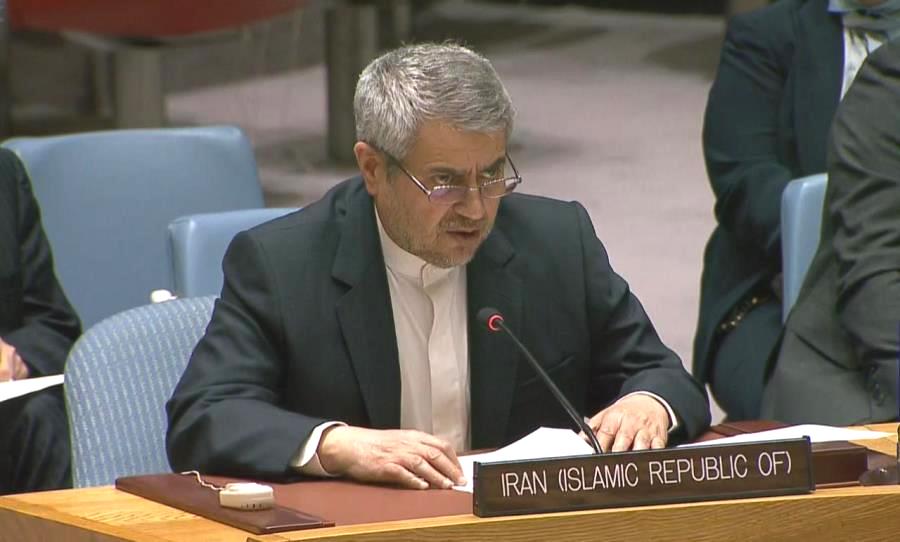
Iran’s Permanent Representative in the United Nations said that the U.S. has turned threatening other countries to a tool in its foreign policy, as a result of which the United Nations and its charter have been undermined. Gholamali Khoshroo added that banning threats and resort to force is one of the significant achievements of the United Nations; nevertheless, some countries – with illegal resort to force or threatening to use force – have threatened the legitimacy of the United Nations. He urged that the United States has become “addicted to imposing sanctions and is using them as a tool in following up its own interests in foreign policy.”
IRNA
Ghassemi: Americans give a wrong address to world’s public opinion
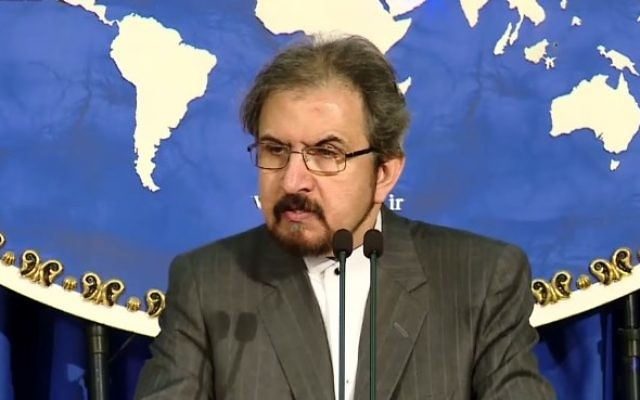
In response to recent remarks of U.S. President Donald Trump and his national security advisor, Iran’s Spokesperson of Foreign Ministry Bahram Ghassemi said, “intensifying baseless accusations by the U.S. officials is due to their successive defeats against the resolve of the Iranian nation and government.”
He urged that from remarks of Trump and John Bolton, one can gather traces of “belligerent people and some regional regimes whose names have always been identical with terrorism and extremism,” adding that “this is obviously giving the wrong address to world public opinion to avert it from their own shameful, bloody, destabilizing, invasive records in the region.”
ISNA
Safavi: our foreign policy must be towards the East
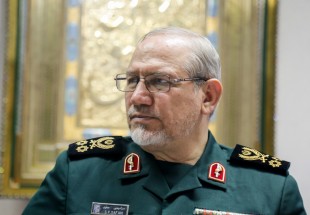
Senior advisor to the supreme leader said Iran must look at the issue of development of economic and defense diplomacy with 15 neighboring countries as an opportunity. Major General Yahya Rahim Safavi added that the world is moving fast towards 2035, and no countries – like the United States – will be the only superpower in the world. “Until 2035, the world, in a reverse move, will turn towards the East and will move towards polarization of power, multilateralism, and instability of power in the West,” said Rahim Safavi. He urged that an Asian power and the power of the Islamic world will be shaped, based on economic and cultural changes.
Taghrib news
